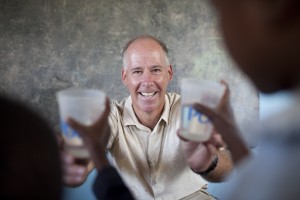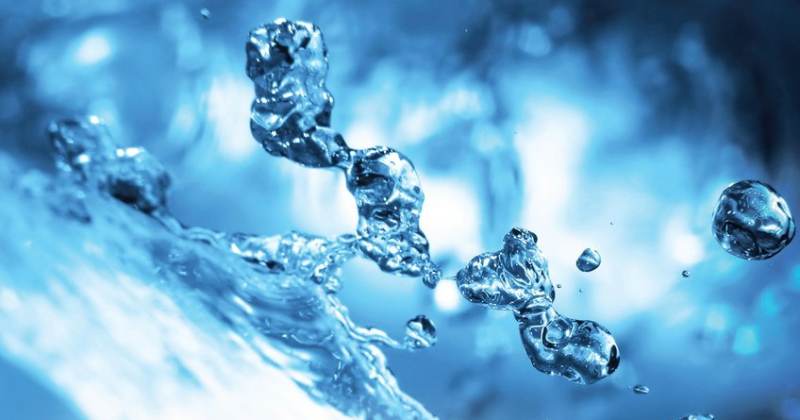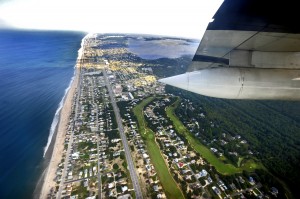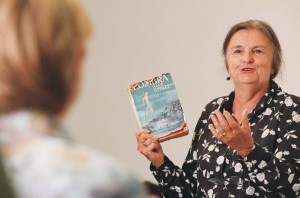
UNC alum Greg Allgood on a trip to Tanzania. Allgood has traveled to more than 60 countries to promote safe drinking water. (photo courtesy of Greg Allgood, Procter & Gamble).
Greg Allgood (B.S. ’81, M.S.P.H. ’83), a Procter & Gamble scientist, knew his company had developed a packet of chemicals that could clean dirty water in 30 minutes. The product drew widespread interest, but it was almost nixed.
Yet one day at a muddy watering hole in Kenya, Allgood learned its deeper value. He watched a woman and her children marvel as a bucket of filthy, germ-ridden water became drinkable using a purification packet. Seconds later, a man lurking in the distance grabbed the bucket and bolted off. The woman fell to her knees and begged Allgood for more packets.
Allgood knew had something special, something needed enough that people would plead for it, something good enough to steal. The scene spurred him to lead the charge to create a nonprofit to provide safe water globally.
“It was life-changing for me that it could mean so much to people if we could reach the right people that really had dirty water,” Allgood recalled.
Allgood is director of P&G’s Children’s Safe Drinking Water Program, which provides more than a billion liters of clean drinking water annually using packets developed in collaboration with the U.S. Centers for Disease Control and Prevention. Allgood led the program’s creation in 2004 after he urged the company to shift from selling packets for profit to a not-for-profit model that would disseminate them in the developing world.
The Cary native, who also is a senior fellow in sustainability at P&G, received his undergraduate degree in biology and master’s in public health from UNC before getting a doctorate in toxicology from N.C. State University. He joined P&G in 1986.
P&G sells the packets at cost to more than 100 humanitarian groups, including FHI 360, Population Services International, World Vision, Samaritan’s Purse, CARE and Save the Children. Each treats 2.5 gallons of water, even if it’s extremely contaminated. The packets contain iron sulfite, which works like a dirt magnet to pull particles like worms and parasites together, and a disinfectant that kills bacteria and viruses that cause cholera, dysentery and typhoid fever. After contaminants settle, water is strained through a clean cloth.
Allgood estimates that the program has provided 5 billion liters of clean drinking water since its inception. P&G plans to celebrate this milestone with a Malawi family that is part of a UNC School of Medicine program for people with AIDS. A video by UNC students will mark the occasion. AIDS is a key focus since it’s critically important that people prone to diarrhea and infections have clean water.
The program has received numerous awards, including the Ron Brown Award — the highest given by the U.S. government for corporate citizenship — and the U.S. Secretary of State’s Corporate Excellence Award..
Allgood, based in Cincinnati, has traveled to more than 60 countries in Central America, Latin America, Africa and Asia. His previous passport became so thick that the director of P&G’s archives seized it to showcase.
The program has other close ties to UNC. The UNC Gillings School of Global Public Health did packet development research, and P&G works closely with the UNC Water Institute to promote household water treatment.
Allgood lectures on sustainability annually at Kenan-Flagler Business School and has worked with faculty there on program case studies. He’s also worked with Morehead-Cain Scholars and UNC School of Journalism and Mass Communication students. In July 2012, he joined a team in Malawi to document the P&G and UNC collaboration and create a series of short films.
On University Day in October 2012, Allgood will be honored with a UNC Distinguished Alumni Award. He’s also co-chair of the advocacy and communications working group of the WHO and UNICEF International Network to Promote Household Water Treatment and Safe Storage and serves on the advisory board of the Clinton Global Initiative.
To date, Allgood estimates that the packets have saved more than 25,000 lives. But he’s even more excited about the future. P&G hopes to grow the program until it saves one life an hour — or around 8,760 lives per year.
“We’re already more than halfway to that goal,” Allgood said. “It’s mind-blowing to me that we could actually be saving one life every hour in the not too distant future.”
[Story by Pamela Babcock, fall 2012 Carolina Arts & Sciences magazine]
Published in the Fall 2012 issue | Features
Read More

Total Immersion: The art and science of water in our world
For more stories about water initiatives in the College, click…

The Future of the Outer Banks: Climate change’s effect on N.C.’s barrier islands
Laura Moore uses historical maps, geologic data and computational modeling…


